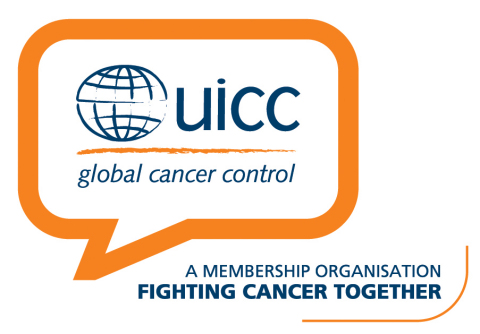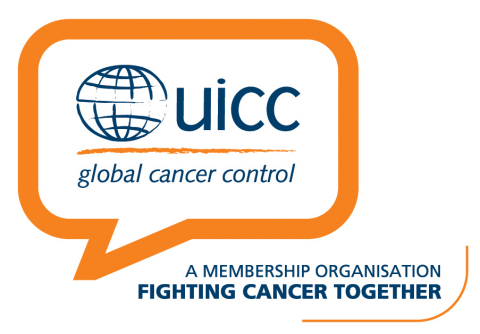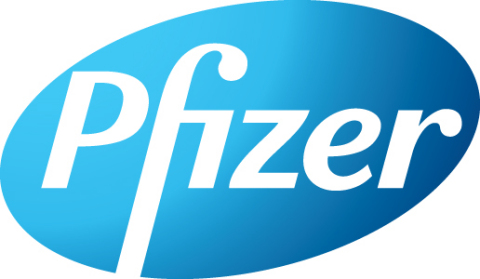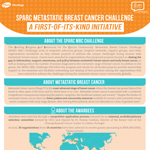NEW YORK--(BUSINESS WIRE)--This Breast Cancer Awareness Month, Pfizer Inc. and the Union for International Cancer Control (UICC) are proud to announce the recipients from the Seeding Progress and Resources for the Cancer Community: Metastatic Breast Cancer Challenge (SPARC MBC Challenge), a first-of-its-kind initiative to address the unique challenges facing women with metastatic breast cancer worldwide. In total, 20 organizations from 18 countries have been selected to receive grants amounting to $760,000 (USD) in funding provided by Pfizer.
Launched on World Cancer Day in February 2015, the SPARC MBC Challenge received significant interest with over 80 applications submitted by organizations in 46 countries, reflecting the urgent need for improved services and support for women with metastatic breast cancer. Due to this high level of interest, Pfizer increased its funding of the initiative from $500,000 (USD) to $760,000 (USD) to support additional projects.
The SPARC MBC Challenge aims to empower advocacy groups, hospital networks, support groups and other organizations worldwide as they initiate projects to close the gap in information, support, awareness and policy between metastatic breast cancer and early disease, as well as help reduce the number of women diagnosed at the metastatic stage of breast cancer.
“Globally, there are wide disparities in the diagnosis, management and care of metastatic breast cancer, a disease that is clinically complex, emotionally burdensome and socially misunderstood,” said Professor Sanchia Aranda, president-elect, UICC. “We are hopeful this program will help us to fulfill our mission of promoting greater equity in access to comprehensive breast cancer services, and we are thrilled with the community’s response to the SPARC MBC Challenge and the number of applications submitted to support projects that can greatly impact the lives of women living with this diagnosis.”
Awardees were selected through a competitive application process overseen by an external, multidisciplinary selection committee formed by UICC and chaired by Dr. Fatima Cardoso, director of the Breast Unit of the Champalimaud Cancer Center in Lisbon, Portugal.
Each awardee will receive either a campaign grant ($20,000 USD) or a network grant ($60,000 USD). These grants will be used to fund projects in support of women with metastatic breast cancer worldwide, including projects in low-income countries, such as Uganda and Haiti, where women are frequently diagnosed at a more advanced stage of breast cancer than women in developed nations.1,2
“Our partnership with UICC on this initiative represents our commitment to the hundreds of thousands of women worldwide who are living with metastatic breast cancer,” said Liz Barrett, global president and general manager, Pfizer Oncology. “This initiative helps bring us one step closer to the day when metastatic breast cancer patients around the world may have access to the care and support they need, regardless of their location or socio-economic status.”
“One particularly valuable component of the SPARC MBC Challenge is that it will also provide mentorship support to the awardees and enable networking and sharing of best practices among the organizations,” said Professor Aranda. “We look forward to following the progress and results of all awarded projects that were selected to address the challenges facing the MBC community globally.”
Among the awardees is Associação Mama Help, an organization based in Portugal that will be creating an online resource center in the Portuguese language to provide information and support to women living with metastatic breast cancer. Additionally, Uganda Women's Cancer Support Organisation (UWOCAO), will implement a project in partnership with the Uganda Cancer Institute to identify the challenges faced by women with advanced breast cancer in Uganda and help increase awareness of their unique needs among advocates, caregivers and policymakers. Based on this understanding, the organization will seek to develop new tools, services and policies to address their needs and to ultimately help increase access to supportive care and improve quality of life for women with metastatic breast cancer.
Additional organizations to receive grants include:
- Asociación Mexicana contra el Cancer de Mama A.C. (Mexico)
- Association of Cancer Patients and Friends(Bulgaria)
- Federación de Mujeres con Cáncer de Mama (Spain)
- Federação Brasileira de Instituições Filantrópicas de Apoio à Saúde da Mama (Brazil)
- Global Women's Health Fund (Zambia)
- Health & Psychological Trust Centre (Nigeria)
- Inshuti Mu Buzima (Rwanda)
- Instituto Oncoguia (Brazil)
- Instituto para la Evaluación de la Calidad y Atención en Salud (Colombia)
- Israel Cancer Association (Israel)
- Kanserle Dans Dernegi (Turkey)
- Narikeldaha Prayas (India)
- National Cancer Society of Malaysia (Malaysia)
- Palliative Care Australia (Australia)
- Project Medishare for Haiti (Haiti)
- Suandok Breast Cancer Network (Thailand)
- University Of Nigeria, Enugu (Nigeria)
- Women for Oncology-Hellas (Greece)
For more information on the SPARC MBC Challenge and the awardees, please visit: uicc.org/sparc-awards.
About Metastatic Breast Cancer
Metastatic breast cancer is the most advanced stage of breast cancer and occurs when cancer spreads beyond the breast to other parts of the body, including the bones, lungs, liver and brain.3 An estimated 1.7 million new cases of breast cancer are diagnosed globally each year, and six percent of breast cancer patients present with metastatic breast cancer at diagnosis.4,5 There is currently no cure for metastatic breast cancer and fewer patient and community resources are available compared to early-stage disease.3,6
About Pfizer Oncology
Pfizer Oncology is committed to the discovery, investigation and development of innovative treatment options to improve the outlook for patients worldwide. Our strong pipeline of biologics and small molecules, one of the most robust in the industry, is studied with precise focus on identifying and translating the best scientific breakthroughs into clinical application for patients across a wide range of cancers. By researchers, cooperative research groups, governments, and licensing partners, Pfizer Oncology strives to cure or control cancer with breakthrough medicines, to deliver the right drug for each patient at the right time. For more information, please visit www.Pfizer.com.
About the Union for International Cancer Control (UICC)
UICC unites the cancer community to reduce the global cancer burden, to promote greater equity, and to integrate cancer control into the world health and development agenda. UICC is the largest cancer-fighting organization of its kind, with over 800 member organizations across 155 countries representing the world's major cancer societies, ministries of health, research institutes, treatment centers and patient groups.
UICC is dedicated to continuing to work with world leaders to increase their support for cancer control measures, and hold them to account for the cancer commitments made in the UN Political Declaration on NCDs. UICC uses key convening opportunities like the World Cancer Congress and World Cancer Day to lobby to:
- Develop targets and indicators to measure the implementation of policies and approaches to prevent and control cancer
- Raise the priority accorded to cancer in the global development agenda
- Promote a global response to cancer
UICC and its multisectoral partners are committed to encouraging governments to adopt specific time-bound targets that address the global burden of cancer and other NCDs. UICC is also a founding member of the NCD Alliance, a global civil society network that now represents almost 2,000 organizations in 170 countries.
For more information visit: www.uicc.org
|
____________________________ |
|
| 1 |
CancerMPact®. Kantar Health. www.cancermpact.com External Links icon. Accessed October 14, 2014. |
| 2 |
World Health Organization. Breast cancer: prevention and control. http://www.who.int/cancer/detection/breastcancer/en/index1.html. Accessed September 24, 2015 |
| 3 |
American Cancer Society. Detailed Guide: Breast Cancer. http://www.cancer.org/acs/groups/cid/documents/webcontent/003090-pdf.pdf. Accessed July 29, 2015. |
| 4 |
GLOBOCAN. 2012 Breast Cancer Incidence and Mortality Worldwide. http://globocan.iarc.fr/Pages/fact_sheets_cancer.aspx. Accessed July 29, 2015. |
| 5 | Barinoff J. Clinicopathological differences between breast cancer in patients with primary metastatic disease and those without: a multicentre study. Eur J Cancer. Jan 2013;49(2):305-11 |
| 6 |
Mayer M, Grober S. Silent Voices: Women with Advanced (Metastatic) Breast Cancer Share Their Needs and Preferences for Information, Support, and Practical Resources. http://www.lbbc.org/sites/default/files/LBBCsilentvoices.pdf. Accessed September 14, 2015. |





